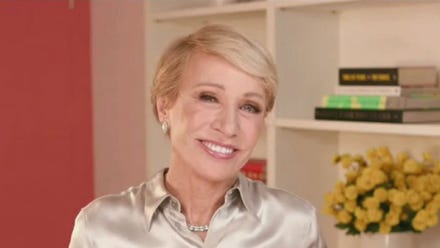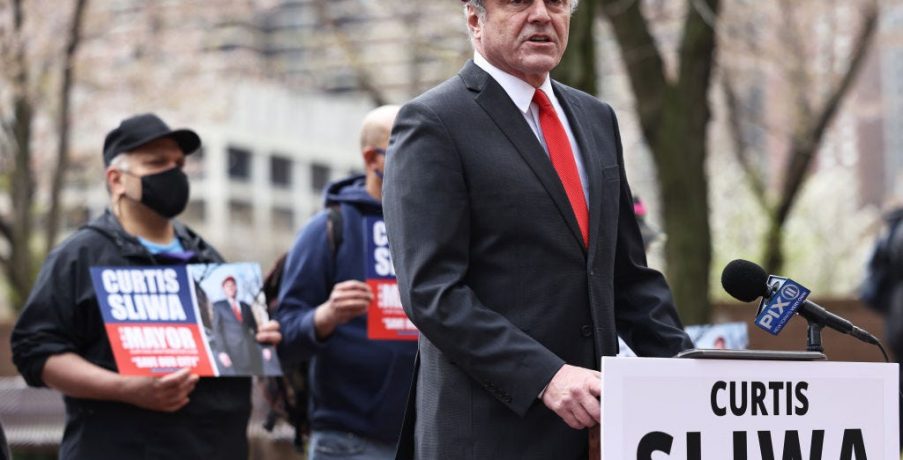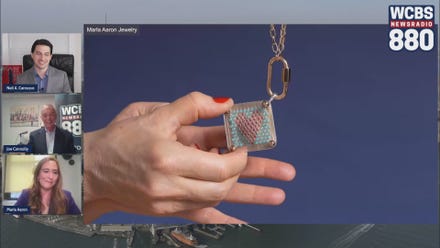
-
VIDEO: Why Barbara Corcoran Believes Best Investments are in People
Post Views: 895By Joe Connolly and Neil A. Carousso
NEW YORK (WCBS 880) — Barbara Corcoran, the self-made “queen of New York real estate,” has always put her customers and her workers, first. That mantra is guiding her businesses out of the COVID-19 pandemic.
“I don’t buy businesses. I buy people,” Corcoran told Joe Connolly and Neil A. Carousso on the latest WCBS Small Business Spotlight, sponsored by Dime Community Bank.
“The reason I was able to build such a large company is because I adored my employees and would do anything for them at any time – anything for them – they came first,” she said. “You have to have that attitude toward employees if you want to do well with them.”
A tight labor market has left many job postings unfilled. The “Shark Tank” star said the businesses that have survived the pandemic are growing, but their biggest challenge is hiring and retaining workers.
“It’s not just at your local restaurants, it’s at your dry cleaners, it’s at your technology companies. Everyone across the board is having a hard time attracting employees,” she said.
Corcoran noted one way to limit turnover is to pay more competitive salaries. She explained many customers are willing to support small businesses in their communities.
“They’re very amiable to helping small businesses if they think they’re helping a good business get ahead. So, you can pass on a lot of those costs, but you have to pay people more,” said Corcoran.

Barbara Corcoran listens to a pitch on ABC’s “Shark Tank.” (Photo Credit: ABC) She told WCBS 880 businesses must be more flexible with remote work, too.
“You have to give them the latitude and the freedom to work different hours, which now, people have been spoiled by because of COVID. Anybody who’s dictating that you must be here 9 to 5, come every day of the week, is not getting the employees because employees have other choices. They just move on and get a better boss so you have to be a phenomenally good boss and do everything you can to help that employee and that’s how you get them,” Corcoran said.
She describes “good bosses” as those who put the needs of their customers and employees before their own. She believes that’s the primary reason that The Corcoran Group blossomed into a $5 billion company when she sold it in 2001.
Corcoran called companies that are still not embracing remote work “stupid.”
“If you’re not budging, you’re stupid because you’re not doing what is the basic, core essence of all business: it’s called change,” she said, noting the seismic shifts businesses have been forced to adapt to over the past 19 months. “Let me tell you, if you don’t acknowledge the change that happens, you don’t stay in business.”
The famous entrepreneur said on the WCBS Small Business Spotlight that the job of the business owner is to spot trends early and direct their team “on which ways to run.” That’s how, she said, small businesses become big businesses.
“You know, the great advantage I saw early in my business when I looked around and saw my big competitors was I picked up on their attitude. They were big shots. The minute I saw everyone playing ‘big shot,’ I knew I had a shot,” said Corcoran, adding, “Most big businesses think they’re competing with other big businesses. They’re not. That’s not the enemy. The enemy is the little business that’s going to come up from behind and bite you in the butt.”
She said she tells companies like Ernst & Young in corporate speeches to think small. As for small businesses, Corcoran advises to learn everything about operating the business; those that are hungry will win the race.
Corcoran turned a $1,000 loan from a boyfriend in 1973 into a multi-billion dollar real estate empire. She told Connolly and Carousso that she budgeted every cent and hustled for every sale to keep her little business alive in the early days. That’s what she’s seeing new entrepreneurs doing today in season 13 of ABC’s “Shark Tank.”
“So many of the entrepreneurs that were standing before us either got fired or left their job,” Corcoran said. “They had part-time things they liked to do and they just decided they had time to think about it. They weren’t happy with their life and that was the time to make a big change and they took their part-time gig and they made it a full-time business. And, ironically, those were the strongest businesses we saw.”
See what it takes to make your dreams a reality on the WCBS Small Business Spotlight featuring Barbara Corcoran above.
-
INTERVIEW: Sliwa fires back at Adams, talks crime and more ahead of mayoral election
Post Views: 572By Lynda Lopez
Produced by Neil A. Carousso
NEW YORK (WCBS 880) — With less than a month to go before voters head to the polls to decide the next mayor of New York City, WCBS 880 spoke with GOP candidate Curtis Sliwa for this week’s 880 Weekly Rewind.
https://omny.fm/shows/880-weekly-rewind/curtis-sliwa-responds-to-eric-adams-labeling-his-cDuring an interview with anchor Lynda Lopez, Sliwa discussed his views on a number of pressing issues affecting New York City, including homelessness, Rikers Island, crime rates and more.
“I’m in the streets, I’m in the public housing projects, I’m in the subway – not with antics – doing the things. For instance, in Brooklyn – which has a severe crime problem, garbage in the streets, all kinds of potholes, quality of life problems – [I’m] really doing the job that the Brooklyn Borough President, Eric Adams, should be doing,” Sliwa said, taking a jab at his Democratic opponent.
LISTEN: Curtis Sliwa responds to Eric Adams labeling his campaign 'antics,' talks crime and more ahead of mayoral election in tonight's 880 Weekly Rewind with @LyndaLopez08 https://t.co/kgQOJHh6gX pic.twitter.com/EfNKSYihh2
— WCBS 880 (@wcbs880) October 8, 2021The founder of the Guardian Angels crime prevention organization noted he had been personally dealing with these types of issues for several years. He said his experiences can help him lead the city in change.
“I walk the streets, ride the subways with no security whatsoever,” Sliwa said, adding that he believes the mayor should be “a role model” for New Yorkers.
Sliwa also took a moment to respond to Adams’ accusations that he has made a “circus” of the New York City mayoral election.
“He may call [my actions] antics, I call them doing service. When you go into a public housing complex at night…and begin to do verticals in a gang controlled public housing complex, or visit Rikers Island to meet with correctional officers on a shift change and see all the problems – that’s not antics, that’s serving the general public,” Sliwa said.
The GOP candidate accused Adams of being too preoccupied with being “wined, dined and pocket lined” to deal with the issues.
Subscribe and download The 880 Weekly Rewind podcast for in-depth reporting and deeper analysis of the top stories of the week, produced by Neil A. Carousso, for WCBS-AM New York.
-
No Laughing Matter: Caroline’s on Broadway Struggles Despite Theatres Reopening
Post Views: 656By Joe Connolly and Neil A. Carousso
NEW YORK (WCBS 880) — Broadway’s return is not providing the comedic relief clubs in the theatre district had been hoping.
Caroline Hirsch, founder and owner of Caroline’s on Broadway, told Joe Connolly and Neil A. Carousso she has never experienced a challenge like the COVID-19 pandemic in her four decades in business.
“Business was going very well until Delta hit again and people were alarmed about going out and being in crowds,” she said of the dominant strain of the virus on the WCBS Small Business Spotlight, sponsored by Dime Community Bank.
The iconic comedy club reopened Memorial Day Weekend with a ton of pent-up demand for laughs. It took a turn late summer.
“When the vaccine mandate came out, it really curtailed business,” said Hirsch, explaining, “We have people who are canceling because somebody in their group is not vaccinated so they won’t come.”
She told WCBS 880 that she believes vaccine mandates are hurting New York’s live entertainment industry, but elevated COVID-19 infections are driving hesitancy as well.
“Some comedians don’t want to go on tour; they want to wait until 2022. So, therefore, we have a bit of a talent shortage,” Hirsch said. “First, we had a labor shortage. We couldn’t hire enough waiters and waitresses. We couldn’t hire enough staff people in the kitchen.”

Carolines On Broadway Owner Caroline Hirsch Photo credit Astrid Stawiarz/Getty Images for Ms. Foundation For Women Caroline’s on Broadway had also been relying on private parties this fall to recover some losses, but some events have been postponed to next year. As a result, she predicts businesses in the Theatre District will experience a slow recovery.
A handful of Broadway shows returned last month at full capacity for fully vaccinated and masked audience members, cast and crew. But, on opening night, Hirsch asked workers in a garage how many cars arrived and found out only two people drove in to see a show.
“I think we need to be realistic about this and not just say, ‘Oh, Broadway’s reopening,’ but Broadway’s going to have a really tough time reopening. And, I think that we all need to help them out. I think people have to make a concerted effort to go out and buy a ticket to Broadway,” she said.
Caroline’s organizes the annual New York Comedy Festival, which makes its return to the stage November 8-14 with pop-up shows throughout the five boroughs.
“We’re going to do close to 150 shows around the city,” Hirsch told Connolly and Carousso.
Bill Maher, Marc Maron and Michelle Wolf are among the comics taking the microphone.
“You’ll have a great laugh,” said Hirsch who admits despite all the pandemic challenges and stress, she is still laughing, herself.
Caroline’s on Broadway first opened as a small cabaret in Manhattan’s Chelsea neighborhood in 1981 before moving to the South Street Seaport six years later. It eventually made its home on Broadway in 1992. Hirsch is known for giving Jerry Seinfeld, Jay Leno and countless other comedians their start.
Watch the WCBS Small Business Spotlight video above for ideas on getting Broadway back on its feet.
-
WCBS 880 Weekly Rewind: Shining a Light on Missing Persons Cases; NJ Nurse Has Change of Heart about COVID Vaccine
Post Views: 580Produced by Neil A. Carousso
NEW YORK (WCBS 880) — The case of Gabby Petito has garnered national attention and her family is hoping to bring awareness to other missing persons cases. Lynda Lopez covers some of those and what resources are available for families on The 880 Weekly Rewind.
https://omny.fm/shows/880-weekly-rewind/shining-a-light-on-missing-persons-cases-nj-nursePlus, vaccination mandates lead to more Americans getting the COVID shot. A New Jersey nurse, previously vocal against the vaccine and mandates, told WCBS 880 why she changed her mind and is now promoting the shot.
Lopez also looks at the dangers of the U.S. defaulting on its roughly $30 trillion debt ahead of a fast approaching deadline while President Joe Biden meets with Democrats to urge unity over the $1 trillion bipartisan infrastructure bill and a $3.5 trillion social spending package.
Subscribe and download The 880 Weekly Rewind podcast for in-depth reporting and deeper analysis of the top stories of the week, produced by Neil A. Carousso, for WCBS-AM New York.
-
When to go ‘All In’ on Your Dream Business
Post Views: 615By Joe Connolly and Neil A. Carousso
NEW YORK (WCBS 880) — Risk is assumed when someone starts a business, but oftentimes, entrepreneurs aim for a soft landing. At some point, founders must take a leap of faith.
Marla Aaron left advertising agency McCann Worldgroup in 2012 where she was vice president of communications for its division MRM. Her aha moment came during a business trip in France. Away from her kids, a coffee pot exploded leaving her with burns and she decided to return home. She presented her husband with an ambitious business plan on PowerPoint and left her job a week later to follow her passion designing jewelry.
Aaron told Joe Connolly and Neil A. Carousso on the WCBS Small Business Spotlight, sponsored by Dime Community Bank, that she wishes she started her jewelry business earlier. Even after she did, she felt rejected when she was initially turned down by major retailers and picked up freelance jobs in advertising as a safety net.
“That was probably a mistake and that was a waste of time because I wasn’t doing anything that well,” she said. “I was probably a mediocre consultant and I was doing a mediocre job starting my business. I had to fully pull the rug out and focus 100 percent.”
Her advice for anyone looking to leave their job to start a business or take their side hustle full-time: “You have to do it. You have to go all in in every respect.”
Aaron went door-to-door in New York’s Diamond District selling her first pieces of fine jewelry made from industrial climbing carabiners. When one retailer took an interest, she knew she had a viable business and began designing, selling, and eventually, building the Marla Aaron Jewelry brand.
She had just signed a lease for her showroom on 47th Street between 5th and 6th Avenues in Midtown Manhattan at the start of the pandemic lockdown. Her new space remained empty.
Instagram helped her showcase her products and communicate her story, but she missed the personal touch with clients. Aaron and her employees had been meeting over Zoom at the beginning and end of each work day to keep everyone engaged. That gave her an idea.
“We’re like Zoom is working for us; let’s do Zoom appointments. So, we started doing Zoom appointments, but it wasn’t just like, ‘Hey Zoom with a customer.’ We understood that it required orchestration, rehearsal, dominating the archive of photos that we had so it would be seamless,” Aaron said.
She discovered that the Zoom appointments were most effective when two sales representatives were on each call. One person operates the technical side, showing their catalogue of product photos, while the other representative describes each piece and asks questions to determine the customers’ tastes.
“We just figured it out,” said Aaron.
Figuring it out was not easy, especially during the height of the COVID-19 pandemic when jewelry was far from prospective customers’ minds.
Before COVID, Aaron vowed to donate silver heart lockets to single mothers every year, which was derived out of her own experience. She remembers feeling down on Mother’s Day as a single mom before her second marriage. Her son was too young at the time to understand the holiday and she sat at brunch empty handed while she watched families exchange flowers. So when her business suffered at the outset of the pandemic, Aaron tried to make the most out of a bad situation and lift the spirits of others.
“We call it the ‘Lock Your Mom Project’ and we give them away to single moms. The first year I gave 50 and every year I had doubled it subsequently. And, the first year of the pandemic, we had planned to give out 800. I was thinking, we can do this. We can figure out a way to get this done,” Aaron said.
While the showroom remained shuttered, they found single mothers online and began shipping lockets from Marla’s house for Mother’s Day 2020. Aaron told Connolly and Carousso that’s when they realized they could sell a lot of jewelry virtually.
Marla Aaron Jewelry has more than 112,000 followers on Instagram. But, what those followers don’t realize is that the woman behind the brand is also the one operating the account.
Aaron calls her business “rebellious” in how they’ve bucked traditional jewelry marketing.
“We speak to people in plain language. It’s not covered in fairies and frost and Photoshop,” she explained. “It’s just really honest and authentic and real.”
Aaron sees her jewelry designs as an extension of herself and believes her story resonates with customers.
Today, she employs 18 people who help manage production, marketing, customer service and her wholesale accounts. Aaron continues to design all the jewelry she sells out of her office in the Diamond District.
See Marla Aaron’s creative process, her advice for taking the leap into entrepreneurship, and the new ways of selling jewelry that has helped her expand her reach on the WCBS Small Business Spotlight video above.











